Building a Community: How CARP African Scholars are Joining Forces to Reduce Disaster Risks
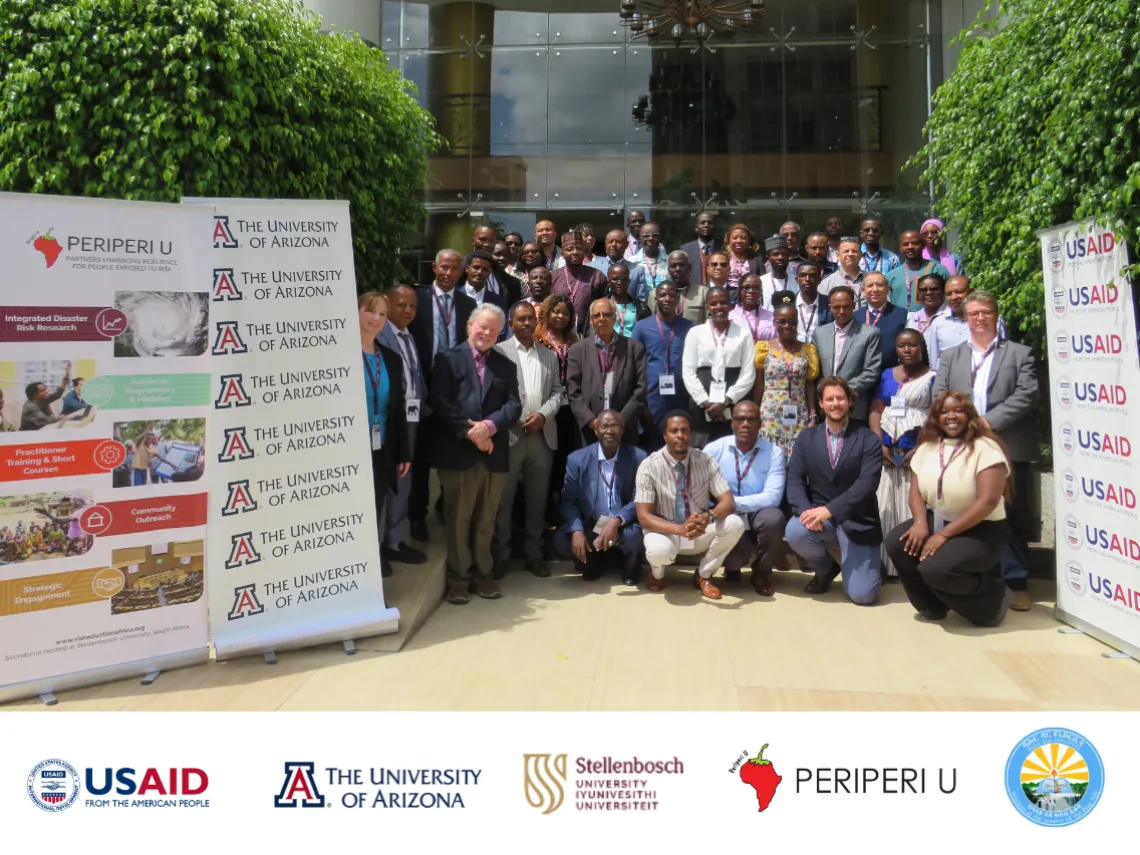
Group photo of the CARP Workshop 2 participants
In early May 2024, the Climate Adaptation Research Program (CARP) hosted its second in-person workshop, themed "Building a CARP Community," to bring together the current cohort of CARP researchers in Africa. The goal of the workshop was to continue building a community of scholars, policymakers, and practitioners to strengthen their efforts to address disaster risk reduction (DRR) in the region. This in-person initiative was vital for enabling CARP scholars and stakeholders working on DRR to collaborate, share ideas, and work towards building a stronger community.
The workshop, hosted in Addis Ababa, Ethiopia, brought together 47 participants representing 21 institutions. Researchers, policymakers, and practitioners came together to learn from and collaborate with one another. Building on the success of the first workshop in Tanzania, the planning committee, which included representatives from the University of Arizona, Stellenbosch University, and Bahir Dar University, was eager to continue fostering collaboration and innovation in climate adaptation research.
The overall goals of CARP workshop 2 were to:
- Share updates on research progress, challenges, insights, and next steps to encourage mutual learning and research support among CARP scholars.
- Engage in skill-building and mutual learning to improve research competencies, focusing on practical skills, tools, and principles for academic writing, publishing, and science communication.
- Build the internal and external CARP community by connecting and collaborating with CARP scholars, engaging with policymakers, practitioners, and other key stakeholders working in climate adaptation and DRR, and learning how to translate and share relevant research findings with diverse international audiences.
Day 1: Setting the Stage
The workshop commenced with the arrival of CARP scholars, and the atmosphere was filled with excitement and anticipation. Old friends reunited, and new connections were quickly forming as attendees began networking and sharing their experiences.
In the afternoon, the focus shifted to an energizing workshop on social media strategies, sparking a vibrant discussion among participants. This session delved into how researchers can harness the power of social media to extend their reach and amplify their impact. Attendees explored the vast potential of various platforms such as learning how to seamlessly integrate social media into their research lifecycle—from data collection to dissemination. The session highlighted the importance of choosing the right platforms for specific engagement goals and provided practical tips on creating captivating content. Participants were particularly engaged by demonstrations on using visuals, infographics, and personal stories to make complex research accessible and compelling. The interactive segment of the workshop had everyone buzzing with excitement as they crafted sample social media posts based on content pillars, which help streamline brainstorming and ensure consistent, goal-aligned content, like CARP's focus on localized research and Disaster Risk Reduction literature in various regions. This hands-on experience showcased the creativity and enthusiasm of CARP scholars, revealing innovative ways to share their research journeys and findings with a global audience.
The session’s impact went beyond just the day’s activities; it inspired the formation of a working social media committee composed of CARP scholars. This dedicated group will continue developing action plans to optimize the use of CARP’s social media platforms and resources, ensuring ongoing support and visibility for their research efforts. The workshop underscored the importance of building a strong online community, not just for professional growth but also for fostering meaningful connections and collaborations across the field.
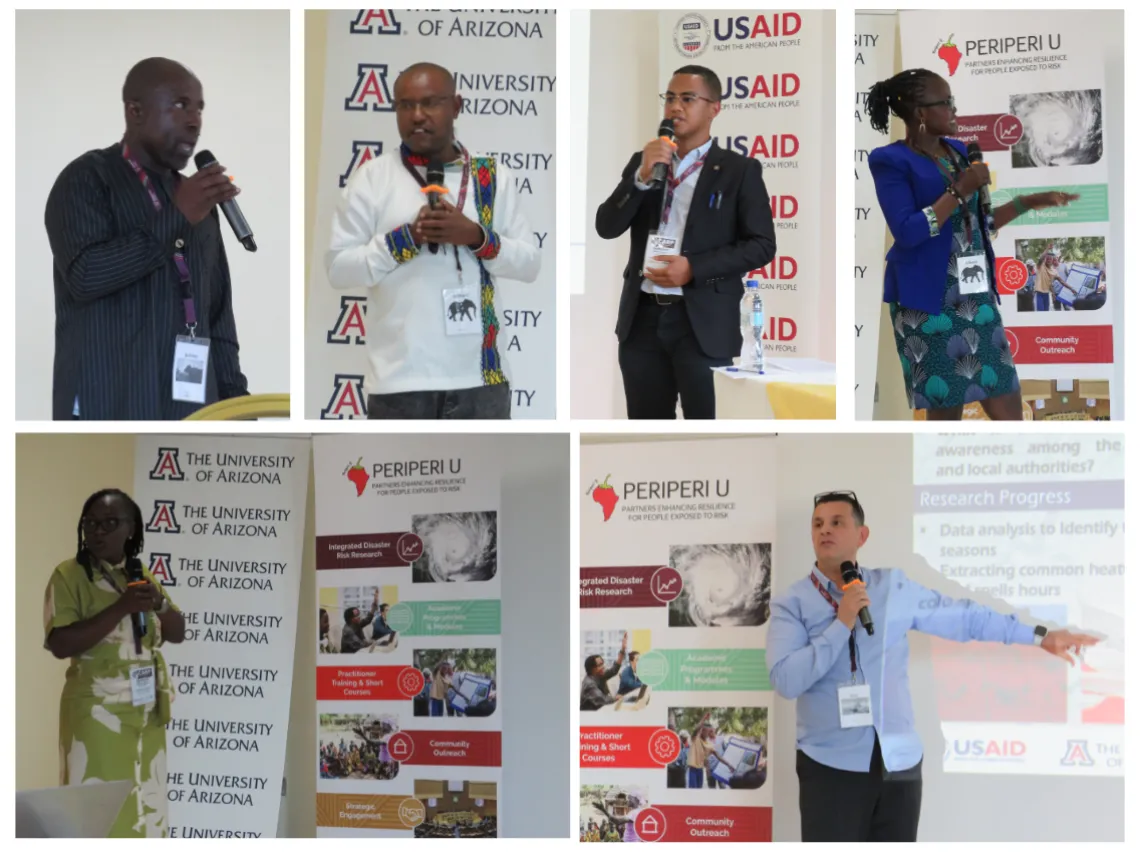
CARP Scholars presenting the progress of their research on Day 1
The first session of Lightning Presentations provided CARP scholars with a dynamic platform to share their latest research endeavors. Each scholar delivered concise, impactful presentations, fostering an engaging environment for showcasing innovative projects and facilitating insightful discussions. One particularly memorable presentation discussed using indigenous knowledge systems to predict weather patterns, sparking a lively discussion on integrating traditional practices with modern technology. The positive energy and collaborative spirit made the workshop an inspiring start to a promising week.
Day 2: Learning from Experts
Day 2 of the workshop began with Dr. Mintesinot Azene Taye from Bahir Dar University delivering the opening remarks and warmly welcoming the Deputy Commissioner of Disaster Risk Reduction (DRR), the Vice President, and representatives from PERI PERI U and the University of Arizona. Alberto Francioli introduced Dr. Tim Finan, who provided insightful opening remarks on best practices and innovative approaches in DRR research. Following this, Dr. Nico Elema acknowledged the Deputy Commissioner and emphasized the significance of the workshop.
Deputy Commissioner at National Disaster Risk Management Commission in Ethiopia, Mr. Nesibu Yasin Seid highlighted the country’s recent strides in DRR initiatives. On May 11, 2023, Ethiopia launched long-term development programs supported by new policy measures, including a crucial proclamation. This aims to strengthen the Commission's mandate and create a functional national platform for DRR, involving regional and federal government bodies, humanitarian partners, scientific communities, and civil society organizations.
Mr. Seid emphasized the importance of collaborative efforts in enhancing educational collaborations. He highlighted the workshop's potential for excellent knowledge exchange among distinguished participants and reassured attendees of the Commission's commitment to utilizing evidence-based research and innovative solutions to address climate change and disaster risk management. With these words, he officially declared the workshop open, wishing all participants productive deliberations. Following Mr. Seid, Professor Sam Ayonghe, the Deputy Vice Chancellor of the University of Buea in Cameroon focused on the crucial role of policy briefs in climate change adaptation. He emphasized the importance of tailoring policy briefs to non-specialists to ensure accessibility and comprehension. The discussions underscored how well-crafted policy briefs help policymakers and stakeholders understand intricate information, facilitating informed decisions. Action items included organizing a national workshop on policy briefs, gathering input from colleagues, and considering additional risk mitigation strategies to inform public decision-making.

Esteemed guests from USAID, World Food Programme, University of Buea, and Bahir Dar University stand with CARP and PERI PERI U management leadership
The afternoon session, introduced by Dr. Corrie Hannah, included presentations from Lamma Balai of USAID, who offered recommendations for potential partnerships and support, emphasizing the need for data collection to support climate adaptation activities. A representative from the World Food Programme, Laco, discussed innovative technologies for small-scale changes in agriculture, highlighting efforts in Somalia and Ethiopia. Guest presentations continued with Prof. Belay Simane from Addis Ababa University, who spoke about building a community of researchers and practitioners to transform research approaches. Breakout groups facilitated by Dr. Hannah provided an opportunity for participants to discuss how best to link research with policy and practice. This collaborative atmosphere fostered dynamic discussions and set the stage for future engagements.
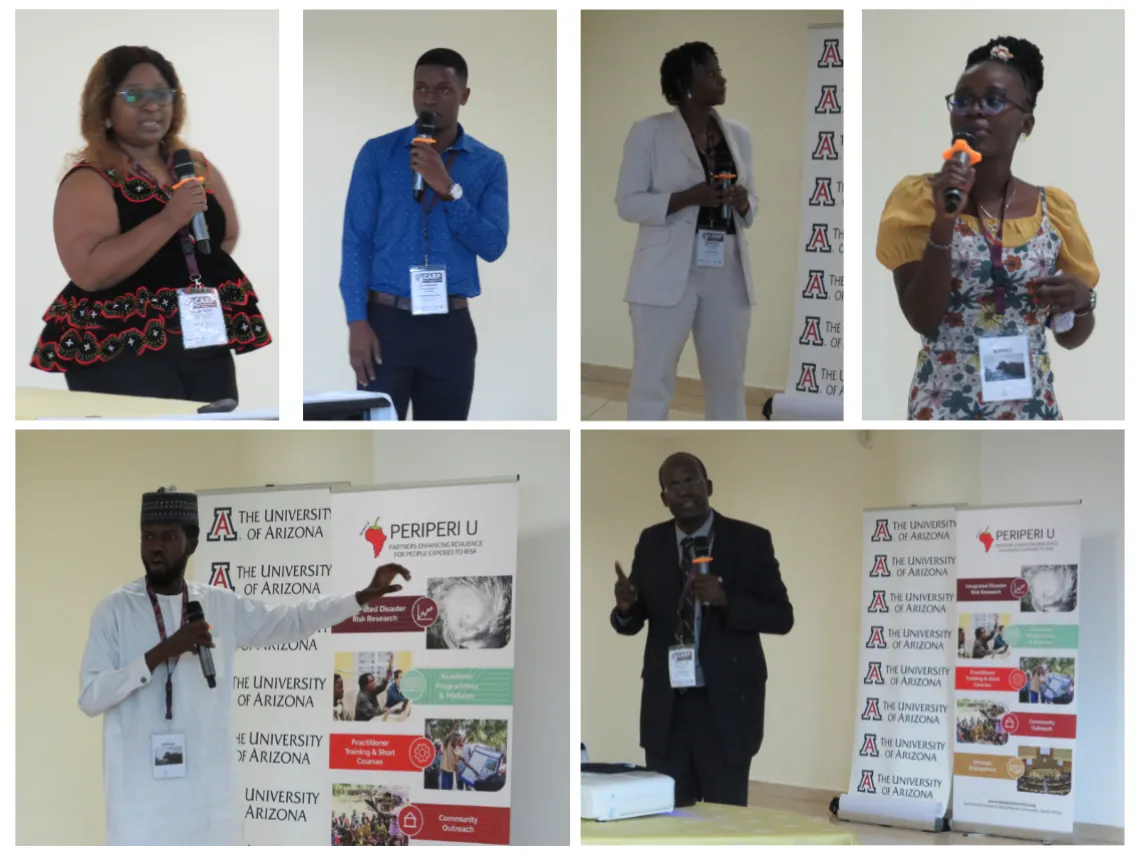
CARP Scholars presenting the progress of their research on Day 2
Day 3: Building the Community
Interactive sessions on qualitative analysis for disaster risk reduction (DRR) and climate adaptation research, as well as participatory GIS for stakeholder engagement, facilitated dynamic discussions and idea sharing. Dr. Dorothea Deus from Ardhi University in Tanzania led an insightful session on participatory GIS. Her demonstration of using GIS tools to map vulnerable communities and plan targeted interventions was particularly engaging and sparked significant interest among CARP scholars. Following her presentation, a lively discussion unfolded, showcasing the enthusiasm and curiosity of the attendees. Scholars exchanged ideas on the potential applications of participatory GIS in their respective fields, discussed the challenges of integrating this technology into existing frameworks, and explored collaborative opportunities to enhance community resilience. The session not only highlighted the practical utility of GIS tools but also underscored the importance of interdisciplinary approaches in addressing complex climate and disaster-related challenges.
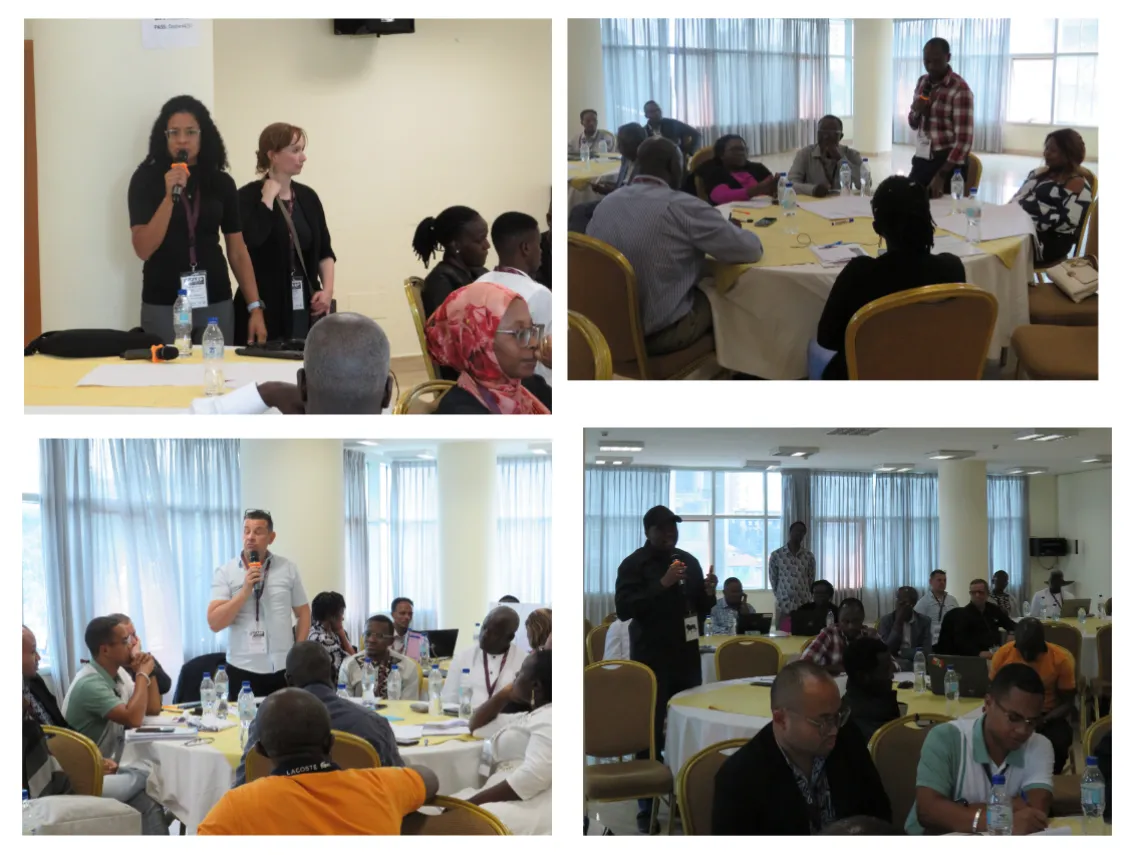
Dr. Sonia Delphin-Perez facilitates a discussion bridging science and policy in Disaster Risk Reduction and climate adaptation
The next session was led by Dr. Sonia Delphin-Perez from the University of Arizona, who guided us through an insightful discussion on the challenges and opportunities in connecting science and policy, particularly in the context of Disaster Risk Reduction and climate adaptation. We explored the numerous hurdles faced by researchers in Africa and other regions, such as generating actionable research that can effectively inform policymakers. The conversation underscored the importance of fostering collaborations with donors and community-based organizations to overcome these challenges. Participants shared valuable experiences and strategies, highlighting the need for innovative research and deeper connections between science and policy. By the end of the session, we aimed to identify not only the obstacles but also potential solutions and opportunities for conducting impactful research. Our goal is to ensure that this knowledge is disseminated widely, making a significant impact and fostering informed policy decisions.
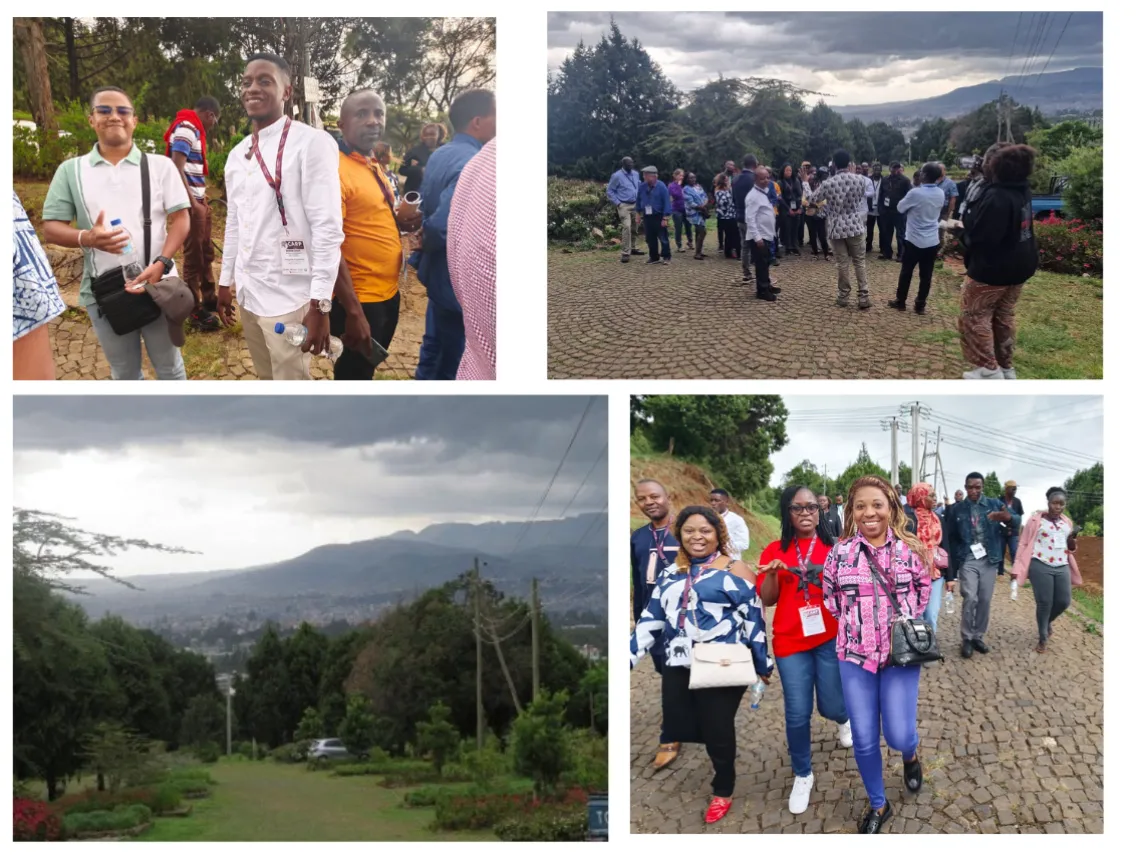
Workshop participants visited Gulele Botanical Garden to learn about Nature-based solutions to Disaster Risk Reduction
A field excursion to Gulele Botanical Garden showcased nature-based solutions for disaster risk reduction. Although the trip was cut short by sudden rain, it remained a fruitful learning opportunity and provided a chance for CARP scholars to bond. The impromptu shelter under a large tree and a small, thatched roof gazebo turned into an unexpected brainstorming session on integrating nature-based solutions in urban planning.
Workshop participants visited Gulele Botanical Garden to learn about Nature-based solutions to Disaster Risk Reduction
Day 3 concluded with a group dinner at Totot Restaurant, where participants celebrated the week’s achievements. The evening was filled with music, cultural performances, and heartfelt conversations, marking the end of a successful and inspiring workshop.
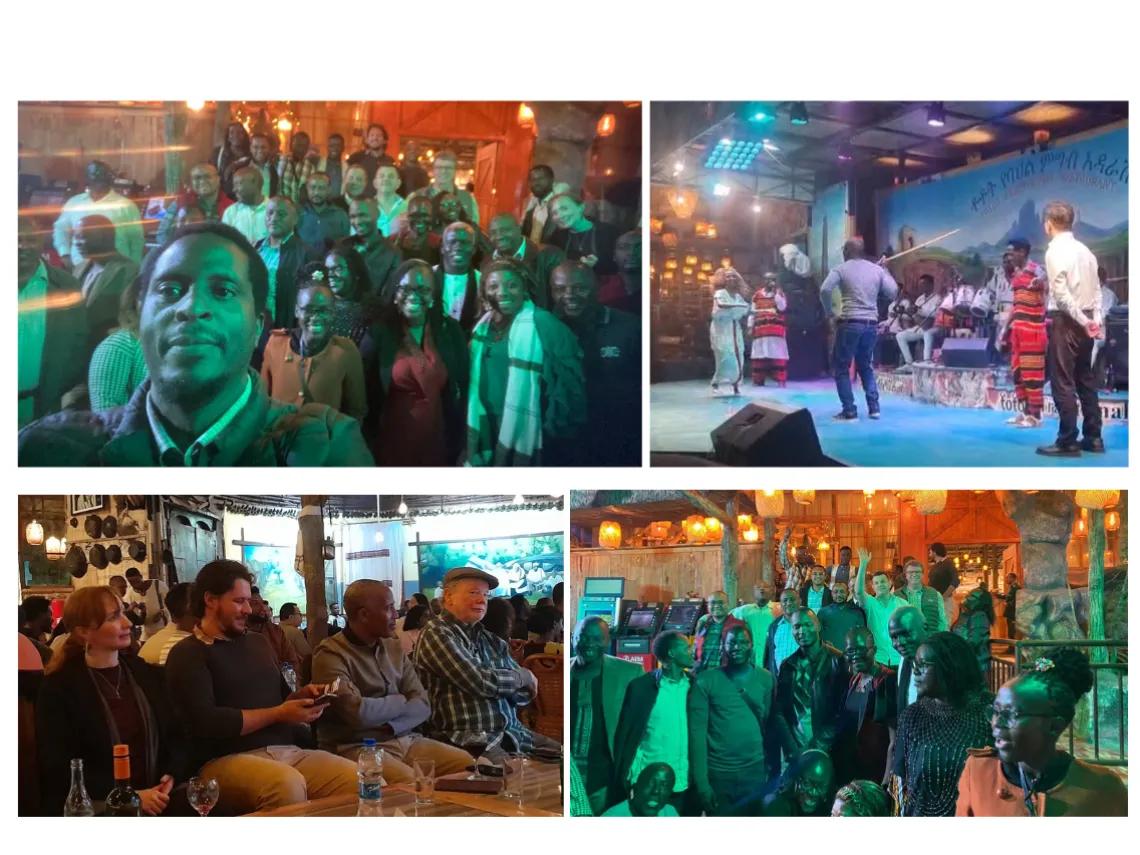
Workshop participants enjoying a final dinner together at Totot Restaurant
Day 4: Reflecting and Moving Forward
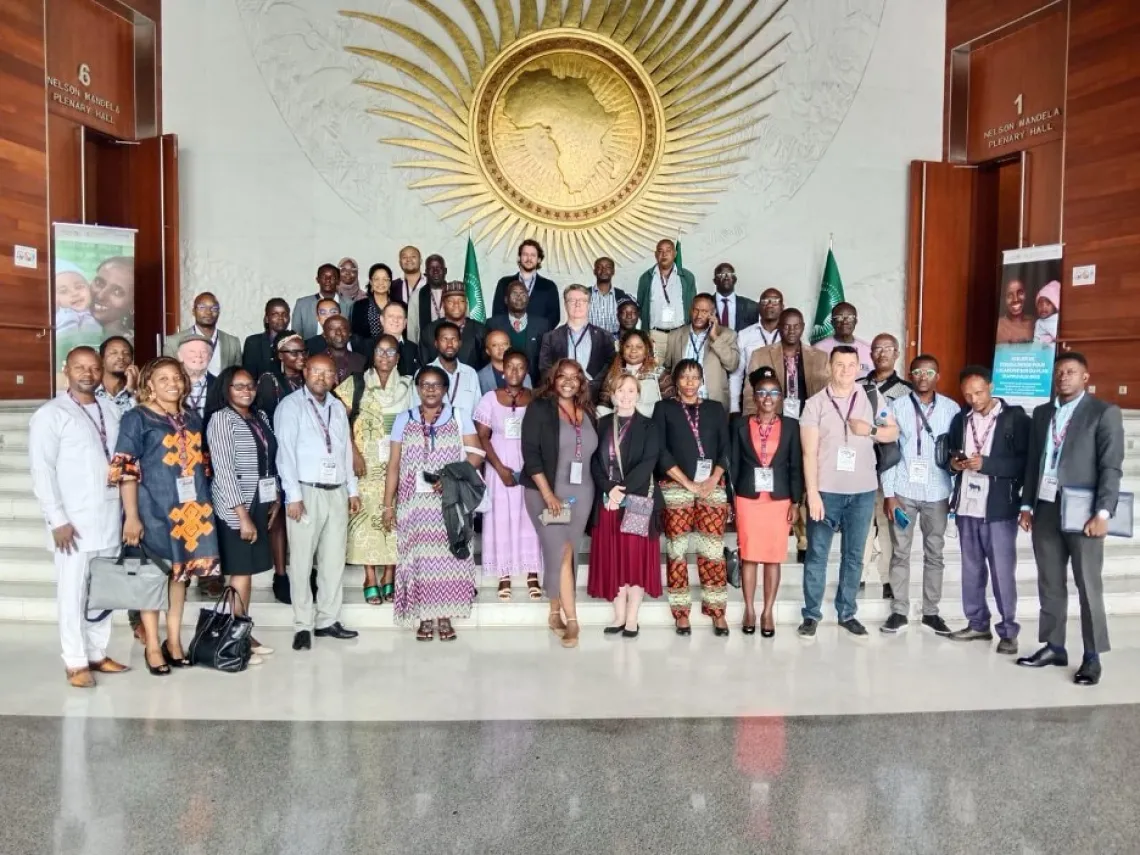
Group photo of the CARP Workshop 2 participants at the African Union headquarters
The final day of the workshop was dedicated to a field excursion to the African Union Headquarters, which offered participants a unique perspective on regional efforts in climate adaptation and DRR, enriching the workshop's context.
Discussions at the Headquarters emphasized the necessity of transboundary disaster management, stressing effective interventions across borders and the convergence of evidence in early warning systems. Challenges such as raising awareness about these systems and informing policy for member states on disaster issues were also discussed. The ongoing drought in Africa was a focal point, with efforts by the AU and regional economic communities to manage and respond to this crisis highlighted, along with the need for coordinated regional support.
Key takeaways included the importance of connectivity in addressing disasters across borders, the launch of the Continental Watch product for early warnings, and the need to address both immediate and long-term impacts of droughts. Improving early warning systems was emphasized, with a focus on investments in data accuracy, multihazard systems, and effective communication. Behavioral changes were highlighted as crucial in mitigating disaster impacts, with challenges in raising awareness about early warning systems noted. Action items included leveraging emerging technologies like Artificial Intelligence/Machine Learning, integrating seismic monitoring, identifying priority research areas, scheduling a drought impact assessment, and improving accountability in disaster response. The excursion provided valuable insights into enhancing disaster risk reduction and response in Africa.
The workshop concluded with final remarks and next steps, ensuring that participants left with clear goals and actionable plans. Reflecting on the workshop, it was evident that the diverse backgrounds and expertise of the participants enriched the discussions and paved the way for future collaborations. Additionally, the Intercontinental Hotel surprised us with a traditional tea ceremony at the end of the workshop. This thoughtful gesture allowed participants to experience a cultural tradition, fostering a sense of community and relaxation after an intensive day of learning and networking. The tea ceremony was not only a delightful surprise but also a symbolic representation of the cultural appreciation and mutual respect that characterized the entire event.
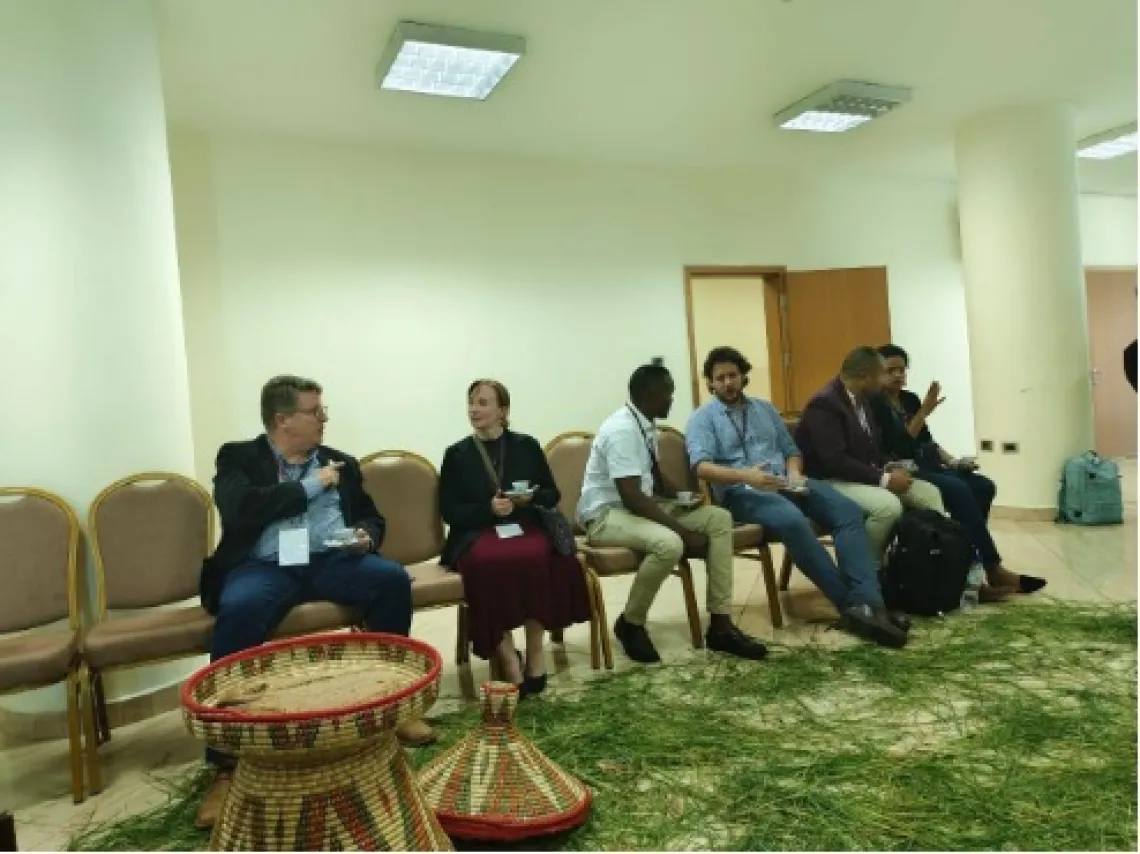
Workshop participants enjoying a surprise traditional coffee ceremony organized by InterContinental Hotel
In summary, CARP Workshop 2 was a resounding success, fostering a vibrant community dedicated to advancing climate adaptation and DRR across Africa. The blend of expert insights, interactive sessions, and personal connections made this workshop a memorable and impactful event.
